In this article:
Probiotics are live cultures of good bacteria that deliver numerous health benefits when consumed in appropriate amounts. This category includes a variety of bacterial strains, but the most notable ones are Lactococcus, Enterococcus, Propionibacterium, and Saccharomyces since their favorable effects are well documented.

You can get your desired dose of probiotics from certain food ingredients that are produced by bacterial fermentation. (1)
Probiotics work by breaking down complex foods into simpler by-products that improve one’s health through different mechanisms. They ease digestion, bolster immunity, and reduce the risk of several ailments.
These live cultures grow inside the body and form a biofilm over the inner cells of the intestine to protect them from the deleterious effects of harmful compounds and leaking of substances into the blood. (2) There is scientific support for the inclusion of probiotics in your daily diet as a means of better health. (3)
However, limit your intake to the recommended amounts because too much of it can disrupt your digestive health and lead to unwanted outcomes.
Probiotic Foods for Good Health
There is an ever-growing list of probiotic foods, (3) and here are some excellent dietary sources of probiotics that can do wonders for your health.
1. Yogurt
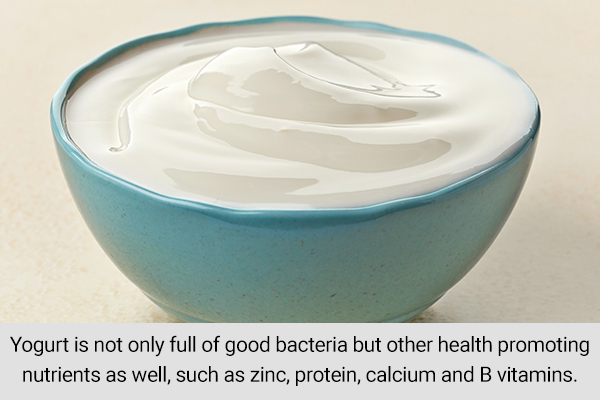
Yogurt is full not only of good bacteria but also other health-promoting nutrients, such as zinc, protein, calcium, and B vitamins. Furthermore, consuming it with vitamin D supplements and additional probiotics can lead to positive health effects. (4)
Consuming yogurt in recommended amounts can help lower the risk of diabetes, cardiovascular ailments, dysbiosis, and chronic kidney disease while improving gut flora and immunity. (5)
2. Kefir
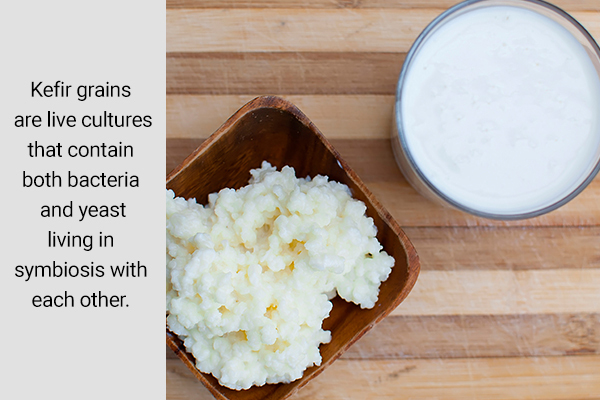
Kefir grains are live cultures that contain both bacteria and yeast living in symbiosis with each other. They are added to milk to create a fermented drink called milk kefir.
The lactase content of kefir is 60% more than that of plain yogurt, which makes it good, if not better, at lactose metabolism. Plus, it is known to have 30% less lactose content than unfermented milk.
Thus, adding kefir to milk can aid digestion and reduce the incidence of flatulence and other digestive symptoms that are normally reported after consuming dairy products. This drink is particularly good for lactose-intolerant individuals. (6)
Kefir is believed to have a higher concentration of probiotics than yogurt.
3. Kimchi
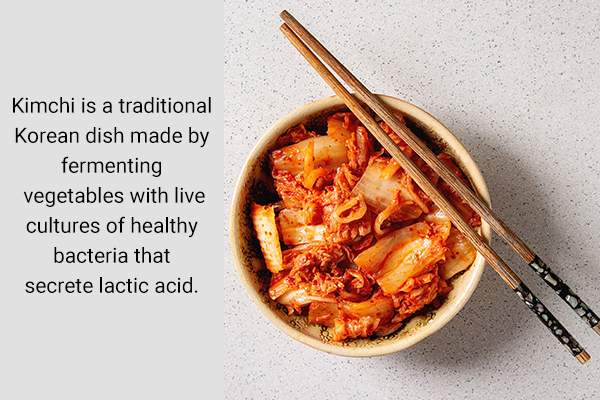
Kimchi is a traditional Korean dish made by fermenting vegetables with live cultures of healthy bacteria that secrete lactic acid. (7)
These bacteria facilitate easy digestion of dairy products and help the intestines to absorb more amino acids in the process. They also promote stronger immunity and help with the treatment and prevention of diarrhea.
While it’s clear this plant-based probiotic is great for your gut health, there is more to it than just that.
Kimchi is known to reduce the risk of atherosclerosis, thus preserving cardiovascular health. It may also help curb the development of cancer cells. It is also helpful in treating various ailments associated with overweight or obesity. (8)
4. Kombucha tea
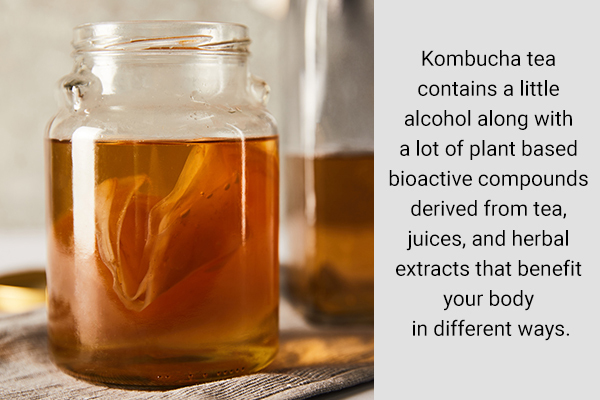
Kombucha is a probiotic beverage that contains multiple strains of acetic acid bacteria, lactic acid bacteria, and yeasts, all of which exhibit significant metabolic activity that promotes good health. (9)
It also contains a little alcohol along with a lot of plant-based bioactive compounds derived from tea, juices, and herbal extracts that further benefit your body in different ways.
5. Buttermilk
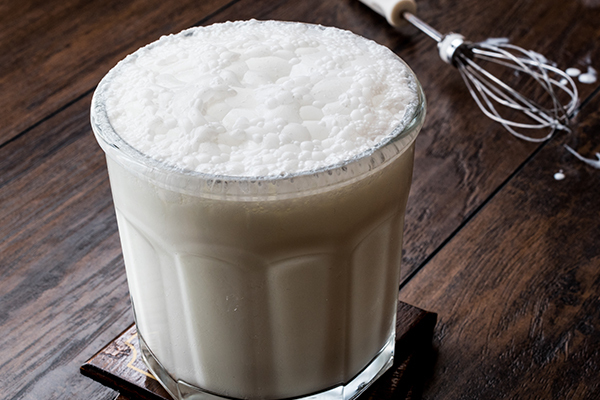
Buttermilk is a healthy probiotic beverage that contains abundant amounts of gut-friendly bacteria.
Normal foods also contain strains of good bacteria, but they are too little to withstand the acidic environment of the small intestine and get destroyed before reaching the large intestine.
Buttermilk, however, is loaded with active and resilient probiotic cultures that survive in such extreme conditions and make their way from the small intestine to the large intestine, where they feed on food fibers (prebiotics) to multiply rapidly.
These healthy bacteria produce antibodies that counteract the harmful bacteria in the gut, creating a state of homeostasis.
Drinking buttermilk after your meals can help you digest food better and improve nutritional absorption as well. (10)
6. Miso

Miso is an ingredient produced by fermenting soy paste with active cultures of healthy bacteria. It contains several strains of gram-positive lactic acid bacteria known as T. halophilus, which is salt tolerant and can grow in the acidic gut environment.
In addition, miso is replete with amino acids and vitamins that add to its nutritive value and give it more health benefits. (11) Eating it in appropriate amounts may help reduce the risk of cancer, inflammation, high blood pressure, premature aging, and other lifestyle-related illnesses.
ALSO READ: Miso Soup Health Benefits and Side Effects
Major Health Benefits of Probiotics
Probiotics can benefit the body in the following ways:
- They release organic acids, bacteriocins, and other substances that help fight harmful bacteria and keep them from overgrowing.
- They control the buildup of bad bacteria in the gut to restore and maintain a healthy and well-balanced microbiome, which is essential for proper digestion, immunity, and overall health.
- They may help control high blood pressure and bring down serum cholesterol levels.
- They can help prevent and manage chronic digestive issues such as irritable bowel syndrome and reduce its associated diarrheal symptoms.
- They stimulate mucus secretion from the epithelial cells lining the gut so that pathogens and toxins don’t stick to it and grow over time to cause digestive distress and infection.
- They boost your immune response by producing antibodies against potential pathogens.
- They secrete the enzyme lactase, which helps metabolize lactose, a sugar found in dairy products that many people find hard to digest. (12)(13)
- They can help reduce the risk of allergies as well as cancer.
Can Probiotics Be Harmful?
People with serious preexisting conditions or compromised immunity run a greater risk of developing adverse outcomes from probiotic intake as opposed to healthy individuals. Potential side effects in such cases include infection and the secretion of harmful by-products by probiotic strains.
Plus, probiotic foods may contain certain microorganisms that are not listed on the label, which in some instances may pose serious health risks to vulnerable populations. (14)
Lastly, excessive consumption of probiotics can throw your gut flora out of balance and upset your digestive system.
Final Word
The best way to get your required dose of probiotics is through dietary sources such as the ones mentioned in this article.
But if you fail to do that, consider starting a probiotic supplement but only after consulting your doctor, especially if you have preexisting health issues. Moreover, people with serious underlying conditions need to be monitored closely while they are on probiotics. (14)
There is limited research about the positive impact of fermented foods on gastrointestinal health, with most studies being of poor quality. (6) Thus, more extensive trials are needed to properly understand and establish the effectiveness of probiotics in this regard.
- Was this article helpful?
- YES, THANKS!NOT REALLY


